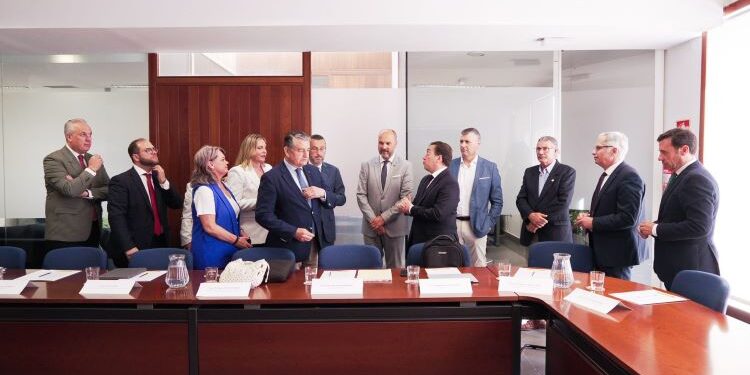Eduardo González
As planned, the Minister of Foreign Affairs, José Manuel Albares, confirmed yesterday to the Junta de Andalucía and the mayors of Campo de Gibraltar that it will not be possible to close an agreement on the future fit of Gibraltar in the EU before the British elections, but insisted that the negotiations “have not stopped.”
Albares met in Algeciras with the counselor of the Presidency of the Government (Junta) of Andalusia, Antonio Sanz, and with the mayors of Campo de Gibraltar to inform them of the latest developments in the negotiations between the EU and the United Kingdom on the future of Gibraltar after Brexit, especially marked by the decision of the Prime Minister of the United Kingdom, Rishi Sunak, to advance the elections to next July 4.
On Monday, the minister hinted that if there is an agreement, it will not be signed before the British elections. “As soon as the new Government is in charge of the United Kingdom, whoever the British decide, I will meet with my new colleague to give the last push and achieve that agreement,” he assured, without further details.
In statements to journalists at the end of yesterday’s meeting in Algeciras, Albares admitted that the early elections in the United Kingdom “evidently make the government come into office and, therefore, it is not a government that can close that agreement, but that does not mean that meetings at a technical level, which are necessary, do not continue to take place.”
Any agreement on Gibraltar could only come into force when it was approved by the new Parliaments of the two parties involved in the negotiations, both the British and the European Parliament. The European Parliament is currently dissolved and it will be several months until the new Parliament that emerges from the European elections on June 9 is formed.
In any case, Albares assured the mayors that “that does not mean that the technical meetings, which are necessary, do not continue to take place” and, in this sense, he assured that, next week, new technical meetings will be held to address, among other matters, the fiscal equality between Gibraltar and the Campo de Gibraltar.
Regarding the details of the negotiations, the minister assured that “very important steps have been taken in various matters” and that, although “the idea is to eliminate the fence that separates the Campo de Gibraltar from the Rock,” the most important thing “is not exclusively the physical fall of the Fence”, but the “free movement of people and goods and therefore the creation of an area of shared prosperity.”
This free movement of people for Gibraltar to integrate into the Schengen area “requires the application of controls and obligations in accordance with the European area”, in the same way that the free movement of goods “requires the controls of the customs union and harmonization to avoid fiscal dumping,” continued Albares, who also expressed Spain’s desire that the Gibraltar airport “also be at the service of Campo de Gibraltar, contributing to its economic development.”
Albares also announced that today, Wednesday, he will hold a meeting with the Cross-border Group, made up of unions and social agents from both sides of the fence, and that he has offered a bilateral meeting to the mayor of La Línea de la Concepción, “which is very “probably the municipality in the European Union that has suffered the most with Brexit and the one that has such a great connection with the Rock that this agreement will have the most favorable impact on it.” The minister has also offered a bilateral meeting to Antonio Sanz, because some of the powers discussed in the negotiations correspond to the Junta.
José Manuel Albares also gave some details about the meeting he held on May 30 in Madrid with the vice president of the European Commission in charge of talks with the United Kingdom after Brexit, Maros Sefcovic, in which both committed to “continue moving forward.” towards the final agreement.” Likewise, he assured that, “of course, the Spanish position in relation to sovereignty will be completely safeguarded.”
The PP knocks down a PSOE motion on Gibraltar in the Senate
On the other hand, the PP yesterday prevented the approval in the Senate of a non-law Proposal of the PSOE in which the Foreign Affairs Commission was asked for the support of the parliamentary groups for the Government’s negotiations with the United Kingdom on Gibraltar.
The motion, which referred to the physical removal of the fence, the free movement of people and goods or the joint use of the airport, had been amended by the PP to include other demands and was finally rejected by the main opposition party with the argument that it was “a blank check” for a negotiation about which they did not have enough information.
“Today the PP had the historic opportunity to support Campo de Gibraltar, its neighbors, town councils and companies,” said the spokesperson for the Socialists in the Senate, Alfonso Moscoso. “Your negative vote once again turns your back on Gibraltar. “They do not want the shared prosperity of companies, workers and people,” he added. For her part, Pilar Rojo, from the PP, assured that the PSOE’s objective is to raise a “smoke screen” to cover “its inability to reach an agreement.”







